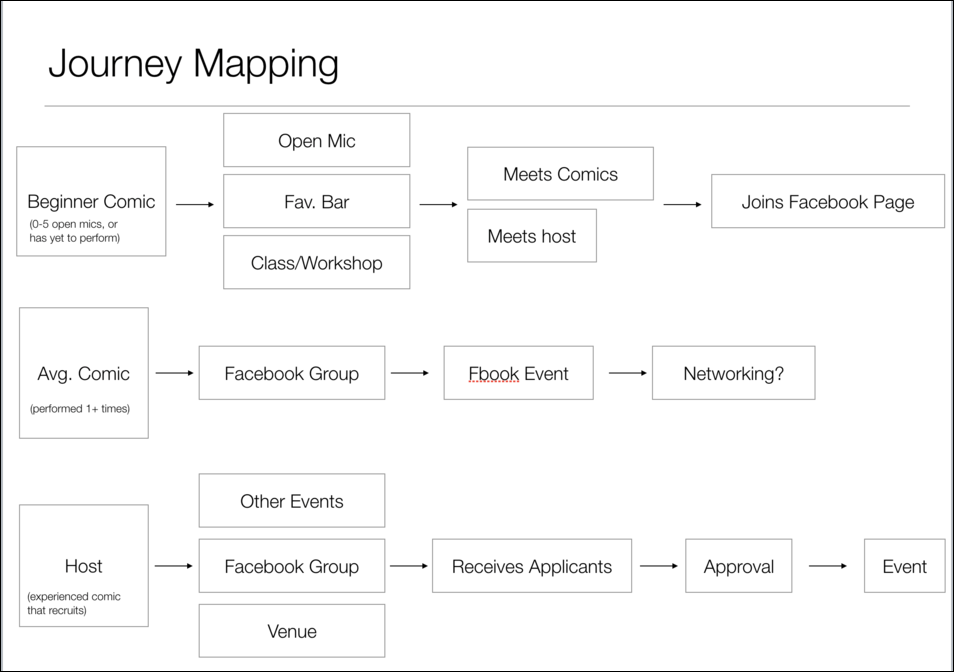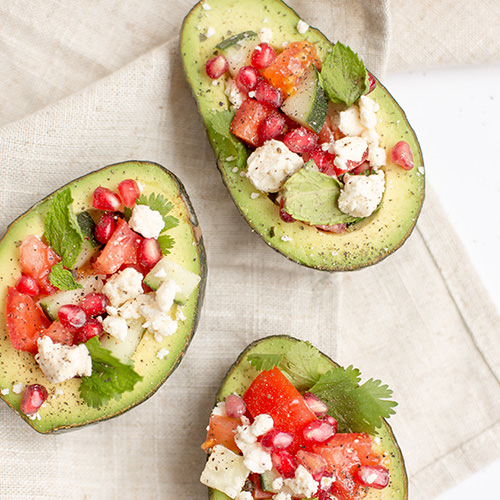Being an amateur stand-up comedian is a pretty thankless (but hopefully not laughless) hobby. The nights are often a grind: shows run late, and are hard to commute to. Refining and testing new material on an unfamiliar crowd takes a lot of courage, time, and energy. It’s also hard to break into without a strong network and the added challenges of managing a day job.
Associate Designer Wendy Schiller spent a month immersing herself in Boston’s local comedy scene to see if she could improve how comedians get to know each other, and promote themselves online.
At Cantina, we strive to create digital products and services that seamlessly fit into people’s lives. What inspired you to build this app?
It started as a conversation with my roommate, who is a local standup comedian. I enjoy going to Boston-area shows with her and supporting her act. Comedy is a hobby that’s highly dependent on location; it’s filled with busy and hardworking people. Comedians are also on their phones all the time: writing material, getting to shows, sharing events via Facebook.
I thought it would be interesting to look at a local community that had a hyper-specific need as a personal mobile design challenge.
What type of research did you do to help validate your idea?
I interviewed some local comedians, and went to a few local shows. I tried to get a sense of what they struggled with the most when it came to comedy. I had a suspicion that it would go one of two ways: either they would need help networking and sharing events, or they would need help writing material. I was surprised how overwhelmingly it turned out that they wanted more help getting to know other comedians, and limiting the use of personal social media platforms like Facebook for these interactions.
Key Takeaways:
- No one wants to cross town to see a comic they don’t know.
- Most comics are very busy.
- Most people don’t know about all the shows near to them.
- It’s hard to get booked/make bookings “if you’re not at an open mic every day.”
- Events are limited by gatekeepers and peer groups.
It makes sense when you think about it- most comedians have busy day jobs or other hobbies, and therefore they struggle to get themselves “out there”, and to meet enough people to get to perform in new spaces. Comedy is more of a local networking experience than a privately creative one.
It makes sense when you think about it- most comedians have busy day jobs or other hobbies, and therefore they struggle to get themselves “out there”, and to meet enough people to get to perform in new spaces. Comedy is more of a local networking experience than a privately creative one.
I also explored the tools people used in their interviews. Most comedians use local Facebook pages to stay in touch with each other and share updates. They manually post spreadsheets and lists of local Open Mics, Hosted Shows, and larger festivals that can end up buried under social posts within the same channel. Also, people remarked about feeling trapped on the platform because there isn’t a good way to share events on a small-scale (under 50 attendees).
What experiences or insights informed your design approach?
I did a lot of the Sprint exercises outlined in Sprint: How to Solve Big Problems and Test New Ideas in Just Five Days by Jake Knapp. Including: “How Might We” (HMW) statements 1, storyboarding, feature iteration and journey mapping. I wanted to strengthen my mobile UI skills too, by designing a little bit of every step of the process to get as broad an experience as possible.
I got to design new iconography for this project, as well as challenge myself to use a limited color scheme that was WCAG accessible. I chose a magenta and navy palette to evoke neon and nightlife.

Through the journey mapping and HMW’s, it became clear that there were three.
How might we…
- increase awareness of local community events?
- help hosts know who to book on their shows?
- help comedians reach out to hosts and other comics they might not know well?
There are three types of participants I was trying to help with the MVP of my design: Beginning Comics, Average Comics, and Show Hosts. I chose these three as a focus because there is a lot of overlap, and they are the most active users in the current Facebook groups. There’s also a lot of interaction directly between these three group types, as beginner comics are often looking to connect more and broaden their network, and hosts are usually looking for new participants in their shows.
In future iterations I would like to expand functionality to benefit venues to help monetize events and connect them with experienced show hosts, or general enthusiasts who are audience members but don’t want to perform themselves.
What are the key features in your design concept that help meet this need?
Since location seemed to be the biggest factor, I wanted to make sure the app contained a map screen that shows anything happening nearby, and an alternate view that shows the same information by calendar or within a larger news feed.
It was also important for users to be able to create events, as well as RSVP or express interest in performing. This was a crucial piece of functionality- because right now there isn’t a great way for new comics to introduce themselves to seasoned veteran hosts other than in-person.
I also wanted to add a profile feature that let them list themes in their performances or regions they preferred to perform, to help hosts in that process.
What was the most pressing issue or challenge you wanted to address with this project?
Proximity and availability end up being the two biggest challenges comedians face. Also, unlike musicians, they aren’t marketing a consistent product or service. One of my interviewees said “It’s hard to sell something that doesn’t exist”. Comics can’t really advertise with their jokes, because then they don’t have any new material to tell when they are performing. So they needed a tool that allowed for promotion, tracking events, and networking, like Facebook or LinkedIN, but with a local focus like Swarm or Foursquare.
I also wanted to help strengthen ties for younger people new to the scene.
What design aspects of your app overcome some of the obstacles you have outlined?
Knowing where an event is, and how frequently it happens, theoretically would improve attendance by local comedians. Knowing where and when each event is, and visually distinguishing between the events you have to get invited to perform at, versus the ones that allow anyone to sign-up makes planning easier. Also, lots of users reported having to cross-town physically to get a “good” slot for an Open Mic happening on the same day. Theoretically a service like this would save everyone hours in their day.
The “contact” button at the bottom of events serves as a way for interested performers to talk to hosts, but I also played with a Bumble or Tindr-like matching feature. One of the pain points I heard of was social anxiety affecting comedians approaching one another. So what if performers could “match” with hosts who run shows?
Having all of the events listed in a dynamic and updateable way is much better than the spreadsheet system that everyone is presently using within the Facebook group.
Having all of the events listed in a dynamic and updateable way is much better than the spreadsheet system that everyone is presently using within the Facebook group.
What will be some initial challenges the concept could face at launch?
Honestly there isn’t a great replacement for Facebook right now due to its gravitational pull: everyone is on it. I wonder how much the specificity of this would actually encourage users to ditch that platform.
-
A method where constraints are developed as questions to target a very specific problem. ↩



